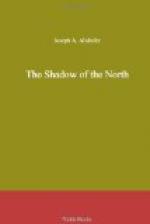“It is but one man and he walks directly toward us,” whispered Tayoga.
“I hear him now,” said Robert. “He is wearing moccasins, as his step is too light for boots.”
“Which means that he’s a rover like ourselves,” said Willet. “Now he’s stopped. There isn’t a sound. The man, whoever he is, has taken alarm, or at least he’s decided that it’s best for him to be more watchful. Perhaps he’s caught a whiff from the ashes of our fire. He’s white or he wouldn’t be here alone, and he’s used to the forest, or he wouldn’t have suspected a presence from so little.”
“The Great Bear thinks clearly,” said Tayoga. “It is surely a white man and some great scout or hunter. He moved a little now to the right, because I heard his buckskin brush lightly against a bush. I think Great Bear is right about the fire. The wind has brought the ashes from it to his nostrils, and he will lie in the bush long before moving.”
“Which doesn’t suit our plans at all,” said Willet. “There’s a chance, just a chance, that I may know who he is. White men of the kind to go scouting through the wilderness are not so plenty on the border that one has to make many guesses. You lads move away a little so you won’t be in line if a shot comes, and I’ll give a signal.”
Robert and Tayoga crept to other points in the brush, and the hunter uttered a whistle, low but very clear and musical. In a moment or two, a like answer came from a place about a hundred yards away, and Willet rising, advanced without hesitation. Robert and Tayoga followed promptly, and a tall figure, emerging from the darkness, came forward to meet them.
The stranger was a man of middle years, and of a singularly wild appearance. His eyes roved continually, and were full of suspicion, and of a sort of smoldering anger, as if he had a grievance against all the world. His hair was long and tangled, his face brown with sun and storm, and his dress more Indian than white. He was heavily armed, and, whether seen in the dusk or in the light, his whole aspect was formidable and dangerous. But Willet continued to advance without hesitation.
“Captain Jack,” he said extending his hand. “We were not looking for you tonight, but no man could be more welcome. These are young friends of mine, brave warriors both, the white and the red, Robert Lennox, who is almost a son to me, and Tayoga, the Onondaga, to whom I feel nearly like a father too.”
Now Robert knew him, and he felt a thrill of surprise, and of the most intense curiosity. Who along the whole border had not heard of Captain Jack, known also as the Black Hunter, the Black Rifle and by many other names? The tale had been told in every cabin in the woods how returning home, he had found his wife and children tomahawked and scalped, and how he had taken a vow of lifelong vengeance upon the Indians, a vow most terribly kept. In all the villages in the Ohio country and along the Great Lakes, the name of Black Rifle was spoken with awe and terror. No more singular and ominous figure ever crossed the pages of border story.




